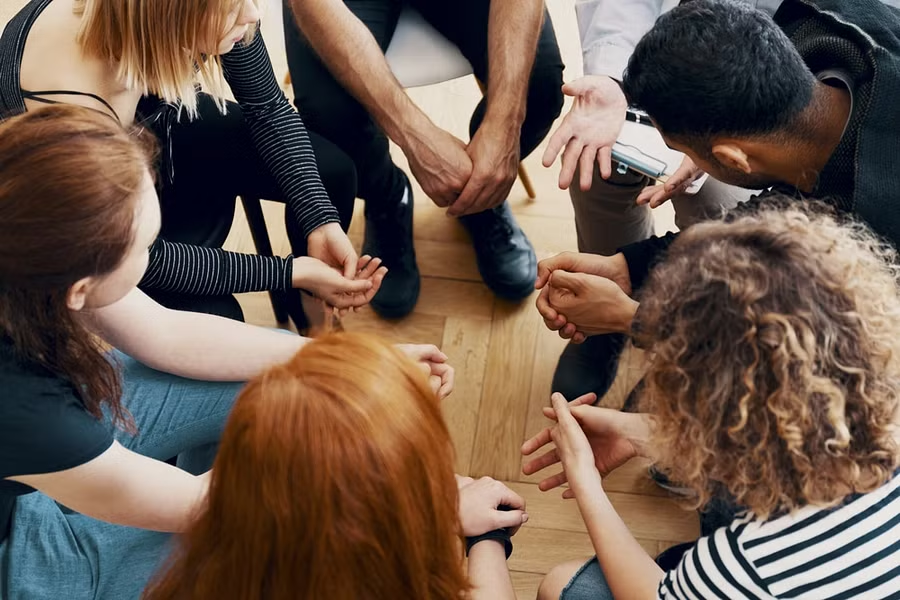Rehab Alumni Group at Live Free Recovery
After completing treatment for an addiction, many individuals in recovery find solace in maintaining relationships with the people that they met while in addiction treatment. An alumni group in rehab provides ways for those in recovery to stay in touch with the other patients and staff who took part in their recovery journeys. This is beneficial as other former rehab members and staff understand the complexities of addiction and one another on deeper levels.
Those who you once considered being fellow patients or rehab staff can become lifelong mentors or friends who expand your support system. This is why, after you complete addiction treatment, we here at Live Free Recovery encourage you to stay connected. By joining our rehab alumni group, you can continue to receive support while navigating your new sober lifestyle.
What is a Rehab Alumni Group?
A rehab alumni group is a continuation of care that is offered to those who have completed treatment. These programs are designed to help people new to recovery stay on track with their sobriety and strengthen their recovery support systems.
Rehab alumni programs offer a variety of services such as emotional support, educational resources, sober social events, and connections to people who understand what you’ve been through.
Leaving treatment is an overwhelming time for many who are on the long journey to recovery. You have so much work ahead of you in staying sober and finding balance in your life again. But it can be done with support from others who are going through the same thing as you and from those who have already completed rehab successfully and may even have advice on how to navigate the next steps.
Common Activities in an Alumni Group

While in an alumni group from rehab, there are many ways that connection is facilitated. One of these ways is through various activities. These activities are all conducted to allow former patients and staff to connect with one another in a sober and safe setting.
A few examples of the types of activities you can participate in through a rehab alumni group include:
- Movie nights
- Support groups
- Annual gatherings
- Checkups/follow-ups
- Dinners at restaurants
- Cookouts or barbeques
- Arts and crafts sessions
- Volunteering opportunities
- Alumni groups on social media
- Bowling and other sporting events
- Hiking and other nature-based outings
These activities help those in recovery discover new ways to have sober fun. Additionally, they can benefit former patients in deep ways.
Often, people lose track of who they are when abusing substances. They may behave or speak in ways they never would normally. Alumni group activities can help you find yourself again once you’ve completed an addiction treatment program. By discovering a new hobby or revisiting a previous hobby that you love surrounded by support, a connection with yourself can be formed along with the connections that you build with others.
The Benefits of Participating in a Rehab Alumni Group
There is a misconception that recovery ends when you complete addiction treatment. Whether you attended inpatient, outpatient, or another form of addiction treatment, your recovery journey is life-long. Addiction is a disease that must be managed for life.
One of the best ways to manage addiction is through continued support. Furthermore, being able to share information about your addiction and recovery, hear stories from those who’ve overcome their addictions, and meet new people who stand by you as a person in recovery, can be highly beneficial.
The main benefit of rehab alumni programs is that they provide critical support to those who have completed rehab successfully. By this, we mean that by offering services such as: connecting with others at the same stage of recovery, building healthy relationships, and finding mentors. A rehab alumni program can also offer the following benefits to graduates of their programs:
- Support from fellow alumni and staff who understand addiction and recovery.
- Access to resources, including 12-step meetings, therapists, and social activities.
- Continued education about addiction and recovery
- Opportunities for volunteer work and job networking
Many patients benefit from being able to participate in aftercare groups that coincide with their treatment experience. Alumni groups also allow former patients to recover from the trauma associated with addiction and alcoholism through group therapy sessions within a safe space and without judgment. Depending on your needs, you may also benefit from taking part in relapse prevention workshops, local 12-step meetings, or other recovery-based events.
Staying Connected to Recovery with Live Free Recovery
No matter what stage of recovery you are currently in, Live Free Recovery is here to help you. If you or a loved one is suffering from an addiction, we offer various types of addiction treatment to get you the help you need. If you have already completed treatment, we invite you to join our rehab alumni group to stay connected to recovery. For more information or to join one of our alumni recovery groups, contact us today.
Resources:
https://www.ncbi.nlm.nih.gov/pmc /articles/ PMC5047716/
https://www.ncbi.nlm.nih.gov/pmc/ articles/ PMC3753023/
https://www.mentalhealth.va.gov/ providers/ sud/selfhelp/docs/ 4_moos_timko_chapter.pdf
Take the First Step Towards a Brighter Tomorrow
At Live Free Recovery, we’re committed to walking alongside you on every step of your journey. Our compassionate team is here to provide the guidance and support you need to overcome addiction and reclaim your life. Don’t wait—reach out today to speak with someone who truly understands your struggles and can help you take that important first step toward healing and a fresh start.
Your path to recovery starts here.
